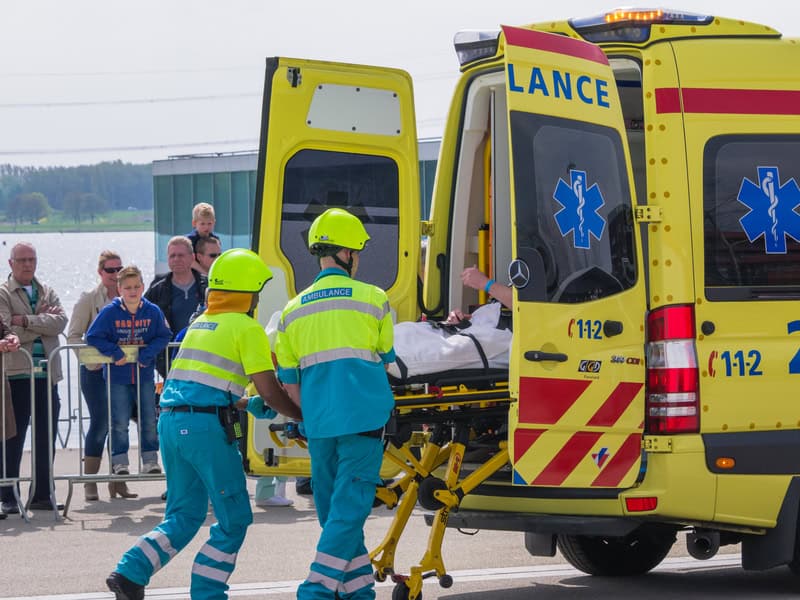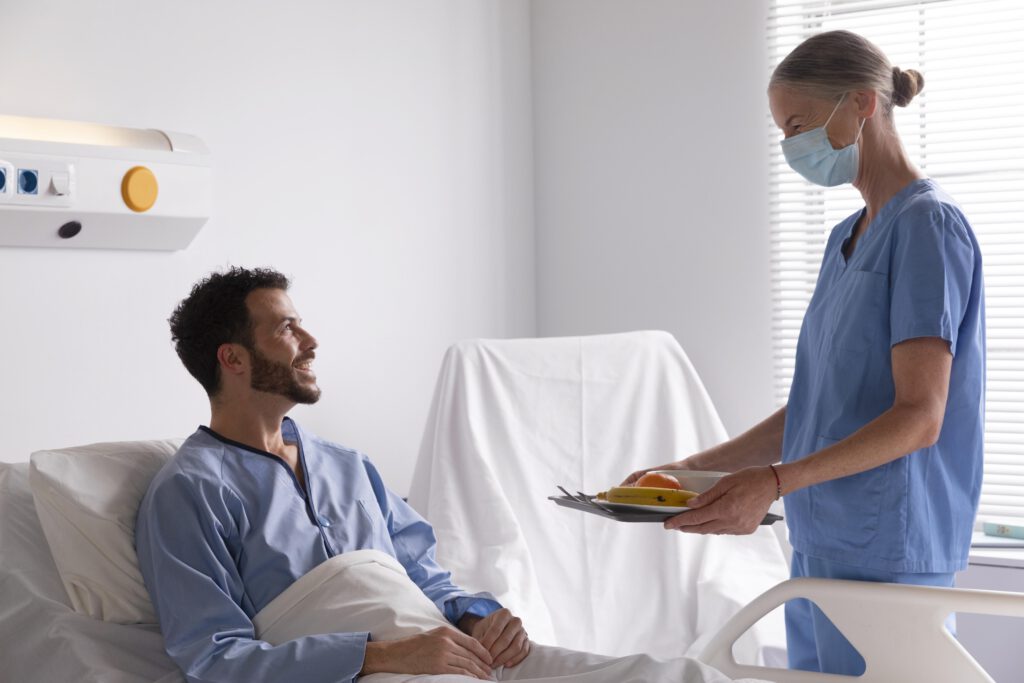Nervously contemplating a visit to a hospital in the Netherlands? We understand the jitters, and the best way to dispel them is to arm yourself with sufficient info so that you’re well prepared.
Between the different types of insurance coverage available and the list of requirements for hospital care, healthcare can get pretty confusing.
We’ve all been there, so we’ve got something to help: a guide on all you need to know about going to the hospital in the Netherlands. 🙌
- 🚑 I need hospital treatment in the Netherlands: What do I do?
- 💼 Staying overnight in a hospital in the Netherlands
- 🤔 Can I go to the hospital if I am not insured?
- 💸 How much will it cost me to go to the hospital?
- 💡 How different types of Dutch health insurance will affect your hospital visit
- 🏥 Different types of hospitals in the Netherlands
- ❓ Going to hospital in the Netherlands: Frequently asked questions
I need hospital treatment in the Netherlands: What do I do?
This depends on your situation; let’s talk about it.
Emergencies
If you’re absolutely desperate for emergency care, calling 112 will be your best bet.
This number will take you through to the ambulance, the fire brigade, or the police.

However, it’s important to note that if you don’t happen to have health insurance, you’ll have to foot the bill for all treatment carried out — including the ambulance that took you to hospital.
If, on the other hand, you have Dutch health insurance, these costs will be covered by your basic insurance.
Non-emergencies
For issues that aren’t life-threatening, it’s best to go through your doctor first. Heading straight to the hospital will cost you much more for issues your doctor would likely be able to treat.
Plus, even if you find yourself requiring care from a specialist, your GP will be able to refer you to one.
READ MORE | The ultimate guide to gynaecology, birth control, and check-ups in the Netherlands

After your GP has referred you to a hospital, you’ll need to register. For this step, it’s important that you bring:
- some form of ID (such as a driver’s licence, ID card, or passport)
- your GP’s information
- your health insurance card
- your BSN
Afterwards, you may be given a folder with all your information, and you’ll need to bring this along with you every time you head to the hospital.
Staying overnight in a hospital in the Netherlands
The thought of staying overnight in a hospital may have sent a volley of questions shooting through your mind, so we’re here to answer some of them for you. 👇
What should I bring with me?
You’re generally advised to bring your toiletries (such as your shampoo and toothpaste), a change of clothes, and whatever medicine you need.
As a personal preference, you may also find it comforting to bring a book or a laptop/tablet with a streaming service along.
Will I get a private room?
Unfortunately, this isn’t the norm.

Most wards are mixed-gender and shared between six patients, though some double rooms are also available.
Can my family stay with me?
Whilst some hospitals may have facilities for your family to stay with you, it’s not a guarantee that all of them will.
Therefore, it’s always important to double-check with the hospital you will be admitted to.
Can I go to the hospital if I am not insured?
Whilst you can definitely go to the hospital if you’re uninsured, it’s a costly option and the total sum of money your treatments are worth may put a serious dent in your finances.
Therefore, getting some sort of health insurance is strongly recommended if you’re going to be moving to the Netherlands.
Let op! In addition to being handy at keeping costs down, having some form of basic health insurance is mandatory by Dutch law.
But what if you’re just jetting to Amsterdam for a month-long summer vacation in Europe? Irrespective of the time period involved, it’s always a good idea to invest in some form of travel insurance.
How much will it cost me to go to the hospital?
If you have Dutch health insurance, the total amount you’ll have to pay will depend on how high your deductible (eigen risico) is.

This is the amount of money you’re obligated to pay before your health insurance kicks in and covers your medical bills. In the Netherlands, your health insurance deductible can range from €385 to €885.
A higher deductible often means you’ll be paying lower monthly health insurance fees — but, let op: this requires you to have a larger sum of money saved up for emergencies.
Not insured? Helaas pindakaas — a trip to the hospital could likely cost you anywhere from fifty to several thousands of euros, depending on your treatment. 😬
How different types of Dutch health insurance will affect your hospital visit
If you’re intending to live in the Netherlands, your first port of call should be ensuring you’ve got appropriate insurance.
READ MORE | 9 things you need to know about Dutch health insurance as an international
The Dutch have two main types of health insurances: basisvezekering (mandatory basic insurance) and aanvullende verzekering (additional/optional insurance).
Basisvezekering
In most cases, basic health insurance is mandatory in the Netherlands. Not being insured may have you on the receiving end of some pretty steep fines. 💸

This insurance is known as basisvezekering, and it covers:
- Basic appointments with your doctor, blood tests, and prescription drugs
- Dental care for children and teenagers under 18 years of age, and emergency dental care for adults over 18
- Emergency treatment, including hospital stays, surgery, and ambulance rides
This insurance carries eigen risico, which is the amount of money that you need to pay out of your own pocket before your insurance provider will cover costs for you.
The good news? You could have part of your healthcare costs covered by zorgtoeslag (or health allowance), if you live and work in the Netherlands.
READ MORE | Toeslagen: Save money with these allowances in the Netherlands
Within your basic health insurance package, you can opt for three different policies: a naturapolis, restitutiepolis, or combinatiepolis.
Naturapolis
With a naturapolis (or in-kind policy), you can only visit healthcare providers with whom your health insurer has an agreement.
Your health insurer will pay your bills directly to the healthcare provider, making the process relatively simple and stress-free for you.
However, if you choose to visit a healthcare provider that’s not affiliated with your health insurer, you will usually need to pay the bills yourself — and your insurer may only reimburse you a certain percentage of the costs.
Restitutiepolis
A restitutiepolis (or restitution policy) gives you the freedom to choose a healthcare provider — even one that’s unaffiliated with your heath insurer.
You’ll generally need to pay your bills directly to your healthcare provider, then submit copies to your health insurer to file a claim.
Depending on your eigen risico (deductible), your insurer may reimburse you the full amount or only a certain amount of it.
Combinatiepolis
A combinatiepolis (or combination policy) is exactly what its name implies: a blend of the in-kind (natura) and restitution (restitutie) policies.
The specifics offered may depend on your health insurer, so it’s always a good idea to check what your policy dictates before taking one out.
Aanvullende verzekering
If the basisvezekering doesn’t provide as wide a range of coverage as you’d like, you can also purchase aanvullende verzekering to go along with it.

Depending on the kind of aanvullende vezekering you’ve chosen, your package will cover:
- Vision care, including spectacles, contact lenses, and ocular treatments
- Full dental care for adults over the age of 18, including fillings, check-ups, and surgery
- Specialist treatments, like intensive psychological help, physiotherapy, and care for audiological issues
Unlike basisvezekering, you aren’t obligated to take out additional health insurance.
Different types of hospitals in the Netherlands
Not only are there different types of insurances, but there are different types of hospitals in the Netherlands.
General hospitals
These are standard hospitals that provide treatments for less specialised issues.
Academic hospitals
These are more specialised than general hospitals, and are hospitals that work alongside the major Dutch universities.
Teaching hospitals
Like academic hospitals, these are specialised hospitals that work alongside a university and are often used for medical staff who are training.
Wondering if you’re in safe hands? Maak je geen zorgen (don’t worry), because they definitely know what they’re doing. 😉
There’s a lot to get your head around, right? If you stick to this guide and are clued-up on your insurance policy, then hospital visits are going to be a breeze.
Have you ever visited a hospital in the Netherlands? Tell us all about your experiences in the comments below!
Going to hospital in the Netherlands: Frequently asked questions
Do I need health insurance to see a doctor in the Netherlands?
No, you are not required to be insured to see a doctor in the Netherlands.
However, if you have no Dutch health insurance, you will be billed as an uninsured patient — meaning that you will need to pay the entire cost of your treatment.
Is Dutch healthcare free for foreigners?
Unfortunately, the Netherlands doesn’t offer free healthcare for foreigners.
Whilst you’ll still be eligible for healthcare, you will have to foot the entirety of your bill yourself. Depending on which healthcare provider you visit, you may have the option to receive financial assistance or pay your bill in instalments.
What do I need to register at a Dutch hospital?
In general, you will be required to show: some form of ID (such a driver’s licence, residence permit, or passport), your health insurance card, your GP’s information, and your BSN.





Can someone help what will be the ‘actual’ procedure in place to take our visiting parents to the hospital for treatments for non emergency illness? We do have travel insurance.
hello, would like to ask about on how we can get an invitation for medical treatment .
My husband collapsed at the airport in the Netherlands! He was taken by ambulance to a General Hospital. He has no insurance and only has access to funds in the US. They refused to treat him (only after I sent what money I had) The hospital negotiated a 40 percent payment with a gov surety for the balance. He has the ability to pay but only after he returns to the US can he access his funds. The hospital has his possessions in security and refuse to let him leave, Can they do this?? I am devastated because he does not speak Dutch and no translators are available. HELP!